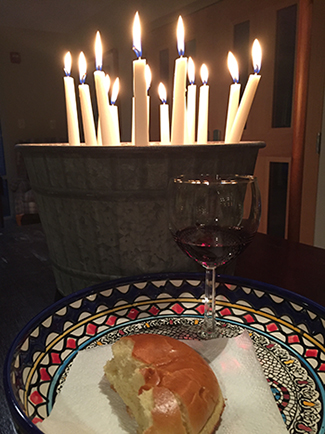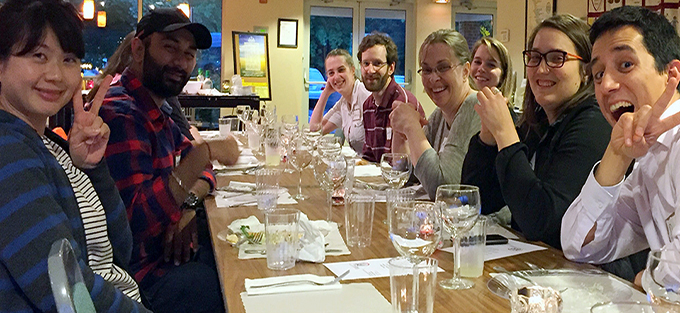by Heidi Eickstadt
Hangry. How many of you know that feeling when you’ve waited a little too long to get your lunch, your blood sugar is low, and you’re feeling so irritable that every little thing makes you feel like you’re gonna snap? When you’re famished, you can’t think straight to make a decision as to where you’re going to eat. Maybe you waited just a little too long to go on lunch break, thinking that you should get just one more thing done before you leave your desk. Yep, I’ve have had a few go-rounds with this hangry thing myself.

Spiritually hangry
Sometimes we forget that we need spiritual food, too. Without it, we can be spiritually hangry. Worship is like our weekly meal for the soul. We gather around the altar table and God serves us multiple courses to satisfy our hungry hearts: God’s word proclaimed and preached, Christ’s body shared in bread and wine and the Holy Spirit shared in the fellowship of community. We are fed and invited to go out and invite others, to share the good news of a feast in a world where so many people are not just spiritually hangry, they are starving.
However, often enough, people feel that they’re not welcome at church, or that church won’t give them the spiritual food they need. Especially among my 20- and 30-something friends, no matter how empty they may feel, no matter how spiritually malnourished they may find themselves, a church service is the last place they would go for feeling less hangry in their lives.
Perhaps they’ve walked into a church and no one said “hi” to them or welcomed them. I speak from experience on that one and yes, it was an ELCA church. (Three weeks in a row.) Some have felt unwelcome as they are, that church members want only those young people who will talk like them, act like them, see the world like them; in other words, that church members are satisfied with superficial relationships and false community. With these kinds of impressions and after these kinds of experiences, we can see why people might find it hard to walk through the doors of a church, let alone come to a church to worship. And that makes me sad.
So I was instantly interested when I heard about dinner church at a worship event for the whole church. I heard Emily Scott speak about St. Lydia’s Dinner Church, New York, and the way it has fostered dialogue, respect and community, and I was inspired to try out a version of dinner church with the congregation where I served as an intern.
Offering a space to be fed
 After about six months of developing a young adult community through pub theology and small group gatherings, our music minister and I began offering a monthly dinner church.
After about six months of developing a young adult community through pub theology and small group gatherings, our music minister and I began offering a monthly dinner church.
We adapted the liturgy from St. Lydia’s Dinner Church, with Dave (our resourceful music minister) playing music on his iPad to accompany our singing, since we didn’t have the Indian musical instrument that St. Lydia uses, a shruti box.
We set up for dinner church in the narthex of the church, right inside the glass doors, so that first-time visitors could find it instantly (and so that anyone who changed their mind about this church thing could slip out quickly).
We confessed and received God’s forgiveness at the font, just inside the doors to the sanctuary, before lighting our tapers from the paschal candle. We then went out to the table in the narthex, lighting the candles with our tapers and lighting our gathering with the flame of Christ’s presence.
As we shared the meal, we fed our bodies with good food and our souls with good conversation about life, our world and our faith. Then I read scripture and offered a short reflection before opening up the conversation to others to share their thoughts about the scripture passage and message. After prayer and communion, everyone helped clear the table and then returned to share the peace (and dessert!) before saying good night.
It was exciting to see young adult parishioners inviting family and friends to dinner church, as well as seeing them help coordinate and lead the gathering. Participation in dinner church varied; our highest turnout was about 14 people. At every dinner, we had at least one person who was new to the church, including family members and friends of members, a student from the nearby university and someone who heard about it through our Meetup.com group.
Dinner church has helped me grow in my understanding of how the church is called to gather in different ways to meet the needs of the community and to share the spiritual nourishment that we all so desperately need.
A non-religious friend who came a few times said, “More churches should do this–more people would come!”
It’s not magic
Dinner church isn’t a magic formula to bring younger people into the congregation. We have realized that we need to lay more groundwork in establishing trusting relationships before dinner church can be a regular thing. In the meantime, we have been inspired to think of new ways to meet people where they are, to create spaces for us to form relationship, to set the table for all to share in the spiritual nourishment our hangry world so desperately needs.
One of the reasons I decided to become a pastor is because I want to be part of how God feeds all God’s children around the communion table. At the altar, Christ accepts all of us and declares all of us worthy of God’s table. When we share a meal with someone, we are accepting them as equals, worthy of sharing our table. Let us share our tables in everyday life, creating space to break bread together while also making room for Christ at those tables, the only food that satisfies our hangry hearts and makes it possible for us to love God, our neighbor and ourselves.
Discussion questions
1. When I am spiritually hangry, I feel overwhelmed, irritable and impatient with others, myself and even God. What does “being spiritually hangry” look like for you? What are some of the ways that you get spiritual nourishment during the week when you are feeling spiritually hangry?
2. Have you ever thought of worship as a meal before? What are some of the ways you find spiritual nourishment in worship? What are some parts of worship that aren’t as spiritually nourishing for you?
3. Think about some meals where you have had meaningful conversations that deepened your relationship with someone else. Did you feel spiritually refreshed and connected as a result? How can we create time and space for sharing our tables and sharing fellowship with Christ and each other? Would you be willing to have a dinner party with friends where Jesus was also invited?
Closing prayer
Loving God, we give you thanks for meeting us where we are and for nourishing us with hope, love and forgiveness. Help us to remember to turn to you to feed our souls and to invite others to share in the food that only you can provide in our hungry world. We pray that we may welcome all to the tables in our lives just as you welcome all to yours. We give thanks for our daily bread and pray that we may remember those who are physically hungry, and that we may work so that all may be fed in our world. In Jesus’ name we pray. Amen.
Heidi Eickstadt is an approved candidate for ordination in the ELCA and a senior at Lutheran Theological Seminary at Philadelphia. She currently serves as vicar at the Lutheran Church of the Abiding Presence in Burke, Virginia. She lives with her husband Christopher and their three cats and dog in Woodbridge, Va. In her free time, she enjoys yoga, traveling, singing and rooting for the Green Bay Packers.
Photos courtesy of the writer. Used with permission.


I just wondered, did you mean “hangry,” or “hungry?” If the former, what does that mean? Great idea and article. Thanks for sharing!
I visited St. Lydia’s a few years ago, while on a mission trip. The thing that struck me most was that, even though we were guests, we were expected to participate ( meaning prepare the meal, set the table, and clean up). We were expected to act like part of the family immediately. I found that so welcoming. I highly recommend this type of worship. If not dinner church, then something else that brings an instant sense of belonging to the guest.
Paul Myers, approved candidate for ordination, assigned to the North Carolina Synod.